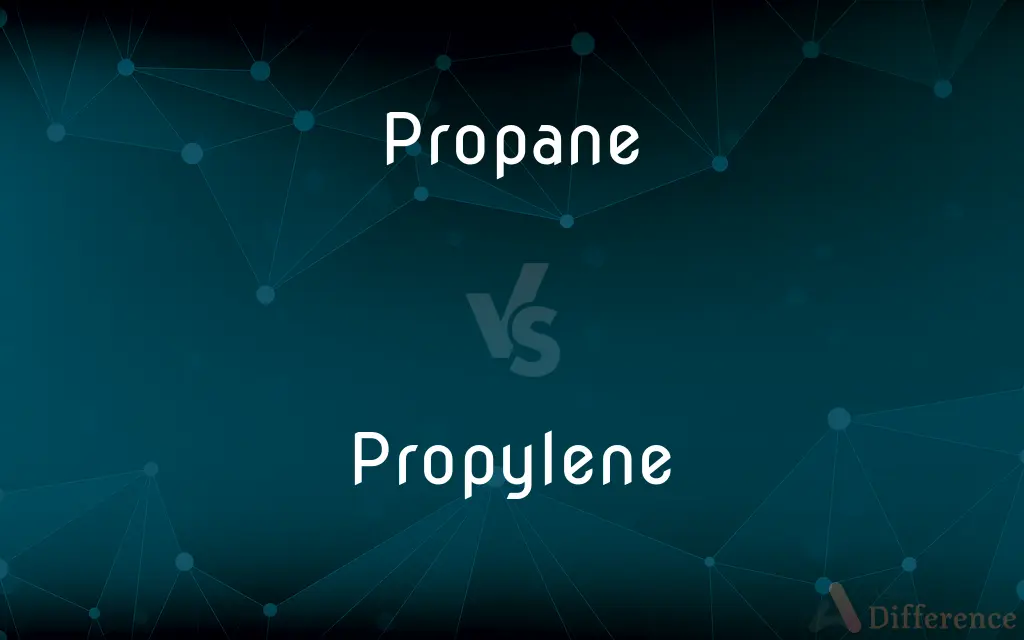Propane vs. Propylene — What's the Difference?
By Tayyaba Rehman — Updated on October 26, 2023
Propane is a saturated hydrocarbon used as fuel, while propylene is an unsaturated hydrocarbon used in plastics and chemicals.

Difference Between Propane and Propylene
Table of Contents
ADVERTISEMENT
Key Differences
Propane, a saturated hydrocarbon with the formula C3H8, is primarily used as a fuel source for heating, cooking, and in vehicles. Propylene, an unsaturated hydrocarbon with a double bond (C3H6), is a key raw material in the production of plastics and chemicals.
Propane is a colorless and odorless gas at standard temperature and pressure, commonly stored as a liquid in pressurized tanks. Propylene, also a gas at standard conditions, is often a byproduct of oil refining and natural gas processing.
The chemical structure of propane makes it stable and less reactive, ideal for safe storage and use as fuel. The presence of a double bond in propylene’s structure gives it a higher reactivity, making it suitable for chemical synthesis.
In everyday use, propane is widely known for its application in barbecue grills, heating systems, and portable stoves. Propylene, however, is less known to the general public but crucial in manufacturing a variety of products, including polypropylene, a common plastic.
While both are hydrocarbons, propane's single-use as a fuel contrasts with propylene's versatility in industrial applications, particularly in the creation of polymers and as a chemical building block.
ADVERTISEMENT
Comparison Chart
Chemical Structure
Saturated hydrocarbon (C3H8)
Unsaturated hydrocarbon (C3H6)
Primary Use
Fuel for heating, cooking, vehicles
Raw material in plastics, chemicals
Physical State
Gas, stored as a liquid
Gas
Chemical Reactivity
Stable, less reactive
More reactive due to double bond
Common Applications
Barbecue grills, heating systems
Manufacturing polypropylene, chemicals
Compare with Definitions
Propane
Portable energy
Camping stoves often use small propane tanks for fuel.
Propylene
Unsaturated hydrocarbon
Propylene contains a double bond in its molecular structure.
Propane
Saturated hydrocarbon
Propane is composed of three carbon atoms and eight hydrogen atoms.
Propylene
Byproduct of refining
Propylene is often obtained as a byproduct in oil refining.
Propane
Fuel gas
We use propane for our backyard barbecue grill.
Propylene
Polymer precursor
Polypropylene is made from polymerized propylene.
Propane
Heating source
Our cabin uses propane for heating during winter.
Propylene
Chemical raw material
Propylene is used to produce various plastics and chemicals.
Propane
Propane () is a three-carbon alkane with the molecular formula C3H8. It is a gas at standard temperature and pressure, but compressible to a transportable liquid.
Propylene
Industrial chemical
Propylene is a key feedstock in the chemical industry.
Propane
A colorless gas, C3H8, found in natural gas and petroleum and widely used as a fuel.
Propylene
A flammable gaseous alkene, C3H6, derived from petroleum hydrocarbon cracking and used in organic synthesis. Also called propene.
Propane
(organic compound) An aliphatic hydrocarbon, C3H8, a constituent of natural gas.
Propylene
(organic compound) The organic chemical compound propene. An alkene which is a colorless gaseous (at room temperature and pressure) hydrocarbon with the chemical formula C3H6.
Propane
A heavy gaseous hydrocarbon, C3H8, of the paraffin series, occurring naturally dissolved in crude petroleum, and also made artificially; - called also propyl hydride.
Propylene
A colorless gaseous hydrocarbon (C3H6) of the ethylene series, having a garlic odor. It occurs in coal gas, and is produced artificially in various ways. Called also propene.
Propane
Colorless gas found in natural gas and petroleum; used as a fuel
Propylene
A flammable gas obtained by cracking petroleum; used in organic synthesis
Propane
Commercial fuel
Many forklifts are powered by propane.
Common Curiosities
What distinguishes propylene’s chemical structure?
Propylene has an unsaturated structure with a double bond.
Is propane a saturated or unsaturated hydrocarbon?
Propane is a saturated hydrocarbon.
Can propane be stored as a liquid?
Yes, propane is commonly stored as a liquid in pressurized tanks.
What is propane primarily used for?
Propane is primarily used as a fuel for heating, cooking, and in vehicles.
What is propylene used to produce?
Propylene is used to produce plastics, polypropylene, and various chemicals.
Is propane reactive?
Propane is relatively stable and less reactive.
How many carbon atoms does propane have?
Propane has three carbon atoms.
What makes propylene important in industry?
Propylene is a crucial raw material in the chemical and plastics industries.
Where is propane often used domestically?
Propane is often used in barbecue grills and home heating systems.
What kind of products does propylene contribute to?
Propylene contributes to the production of plastics, fibers, and various industrial chemicals.
What makes propylene more reactive than propane?
The presence of a double bond in propylene makes it more reactive.
Is propylene a gas or liquid at room temperature?
Propylene is a gas at room temperature.
Can propane be used for portable energy?
Yes, propane is used for portable energy in camping stoves and outdoor equipment.
How is propylene obtained commercially?
Propylene is often obtained as a byproduct of oil refining and natural gas processing.
Is propane widely known outside of industrial settings?
Yes, propane is widely known and used in residential settings, especially for cooking and heating.
Share Your Discovery

Previous Comparison
Mutter vs. Utter
Next Comparison
Slave vs. SubAuthor Spotlight
Written by
Tayyaba RehmanTayyaba Rehman is a distinguished writer, currently serving as a primary contributor to askdifference.com. As a researcher in semantics and etymology, Tayyaba's passion for the complexity of languages and their distinctions has found a perfect home on the platform. Tayyaba delves into the intricacies of language, distinguishing between commonly confused words and phrases, thereby providing clarity for readers worldwide.















































